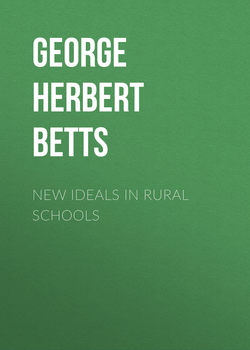New Ideals in Rural Schools

Реклама. ООО «ЛитРес», ИНН: 7719571260.
Оглавление
George Herbert Betts. New Ideals in Rural Schools
EDITOR'S INTRODUCTION
PREFACE
I. THE RURAL SCHOOL AND ITS PROBLEM
The general problem of the rural school
The special problem of the rural school
The adjustment of the rural school to its problem
II. THE SOCIAL ORGANIZATION OF THE RURAL SCHOOL
The rural school and the community
The consolidation of rural schools
Financial support of the rural school
III. THE CURRICULUM OF THE RURAL SCHOOL
The scope of the rural school curriculum
The rural elementary school curriculum
The rural high school curriculum
IV. THE TEACHING OF THE RURAL SCHOOL
The importance of teaching
Teaching in the rural school
The training of rural teachers
Salaries of rural teachers
Supervision of rural teaching
OUTLINE
I. THE RURAL SCHOOL AND ITS PROBLEM
II. THE SOCIAL ORGANIZATION OF THE RURAL SCHOOL
III. THE CURRICULUM OF THE RURAL SCHOOL
IV. THE TEACHING OF THE RURAL SCHOOL
RIVERSIDE EDUCATIONAL MONOGRAPHS. GENERAL EDUCATIONAL THEORY
ADMINISTRATION AND SUPERVISION OF SCHOOLS
METHODS OF TEACHING
RIVERSIDE TEXTBOOKS IN EDUCATION
The HOUGHTON MIFFLIN PROFESSIONAL LIBRARY
The HOUGHTON MIFFLIN PROFESSIONAL LIBRARY
Отрывок из книги
The general problem of the rural school is the same as that of any other type of school—to render to the community the largest possible returns upon its investment in education with the least possible waste. Schools are great education factories set up at public expense. The raw material consists of the children of succeeding generations, helpless and inefficient because of ignorance and immaturity. The school is to turn out as its product men and women ready and able to take up their part in the great world of activities going on about them. It is in this way, in efficient education, that society gets its return for its investment in the schools.
The word "education" has in recent years been taking on a new and more vital meaning. In earlier times the value of education was assumed, or vaguely taken on faith. Education was supposed to consist of so much "learning," or a given amount of "discipline," or a certain quantity of "culture." Under the newer definition, education may include all these things, but it must do more; it must relate itself immediately and concretely to the business of living. We no longer inquire of one how much he knows, or the degree to which his powers have been "cultivated"; but rather to what extent his education has led to a more fruitful life in the home, the state, the church, and other social institutions; how largely it has helped him to more effective work in a worthy occupation; and whether it has resulted in greater enjoyment and appreciation of the finer values of personal experience,—in short, whether for him education spells efficiency.
.....
The rural community affords few opportunities for social recreations and amusements. Not only are the people widely separated from each other by distance, but the work of the farm is exacting, and often requires all the hours of the day not demanded for sleep. While the city offers many opportunities for choice of recreation or amusement, the country affords almost none. The city worker has his evenings, usually Saturday afternoon, and all day Sunday free to use as he chooses. Such is not the case on the farm; for after the day in the field the chores must be done, and the stock cared for. And even on Sunday, the routine must be carried out. The work of the farm has a tendency, therefore, to become much of a grind, and certainly will become so unless some limit is set to the exactions of farm labor on the time and strength of the worker. It separates the individual from his fellows in the greater part of the farm work and gives him little opportunity for social recreations or play.
One of the best evidences that the conditions of life and work on the farm need to be improved is the number of people who are leaving the farm for the city. This movement has been especially rapid during the last thirty years of our history, and has continued until approximately one half our people now live in towns or cities. Not only is this loss of agricultural population serious to farming itself, creating a shortage of labor for the work of the farm, but it results in crowding other occupations already too full. There is no doubt that we have too many lawyers, doctors, merchants, clerks, and the like for the number of workers engaged in fundamental productive vocations. Smaller farms, cultivated intensively, would be a great economic advantage to the country, and would take care of a far larger proportion of our people than are now engaged in agriculture.
.....